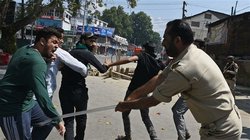 “I am deeply concerned about the impact of recent actions by the government of India on the human rights of Kashmiris.”
“I am deeply concerned about the impact of recent actions by the government of India on the human rights of Kashmiris.” RNA - Those are the words of Michelle Bachelet, the United Nations High Commissioner for Human Rights, who highlighted the issue of Kashmir in her opening statement to the UN Human Rights Council in Geneva on Monday.
Bachelet pointed to “restrictions on internet communications and peaceful assembly, and the detention of local political leaders and activists.”
The UN rights chief said she had “appealed particularly to India to ease the current lockdowns or curfews, to ensure people’s access to basic services, and that all due process rights are respected for those who have been detained.”
“It is important that the people of Kashmir are consulted and engaged in any decision-making processes that have an impact on their future.”
Indian authorities tightened the security lockdown in Kashmir on Sunday after breaking up religious processions by Shia Muslims who defied a ban.
On August 5, Indian Prime Minister Narendra Modi revoked special rights for the state of Jammu and Kashmir. The long-standing constitutional provisions for the region are no longer legally valid.
Following the move, India deployed troops to the region to stymie potential protests. The government in New Delhi also imposed severe restrictions on movements, and cut all telephone, mobile phone and internet connections.
The controversial action has angered both Pakistan, which controls parts of Kashmir, and the local population.
Some of the restrictions have been eased but no prominent detainees have been freed. Mobile and internet connections remain suspended, too.
India has long accused Pakistan of training, arming and sending militants to Kashmir. Pakistan denies direct support but says it gives moral and diplomatic support to the Kashmiri people in their struggle for self-determination.
Pakistan’s Foreign Minister Shah Mehmood Qureshi is scheduled to address the Human Rights Council on Tuesday, with a speech expected to focus heavily on the situation in Kashmir, which has been split between India and Pakistan since their partition in 1947.
In August that year, the British Raj was dismantled with the subcontinent divided into two independent states, Hindu-majority India and Muslim-majority Pakistan.
Millions were uprooted in one of the largest mass migrations in history, with experts estimating at least one million died in communal violence unleashed by partition that continues to haunt the subcontinent to this day.
Elsewhere in her remarks, Bachelet voiced concern over India’s citizenship register in the northeastern state of Assam.
She said some 1.9 million people had been excluded from the final list, which was published on August 31. Bachelet said the register had “caused great uncertainty and anxiety.”
“I appeal to the government to ensure due process during the appeals process, prevent deportation or detention, and ensure people are protected from statelessness.”
Modi’s Hindu nationalist Bharatiya Janata Party (BJP) runs Assam. The Indian prime minister is now under fire by critics who say the National Register of Citizens (NRC) process reflects the party’s goal to serve only its coreligionists.
Political opponents say the NRC is being used by the BJP to marginalize the large minority of Muslims in Assam, many of whom fled there when East Pakistan broke violently from Islamabad in 1971 to become Bangladesh.
847/940